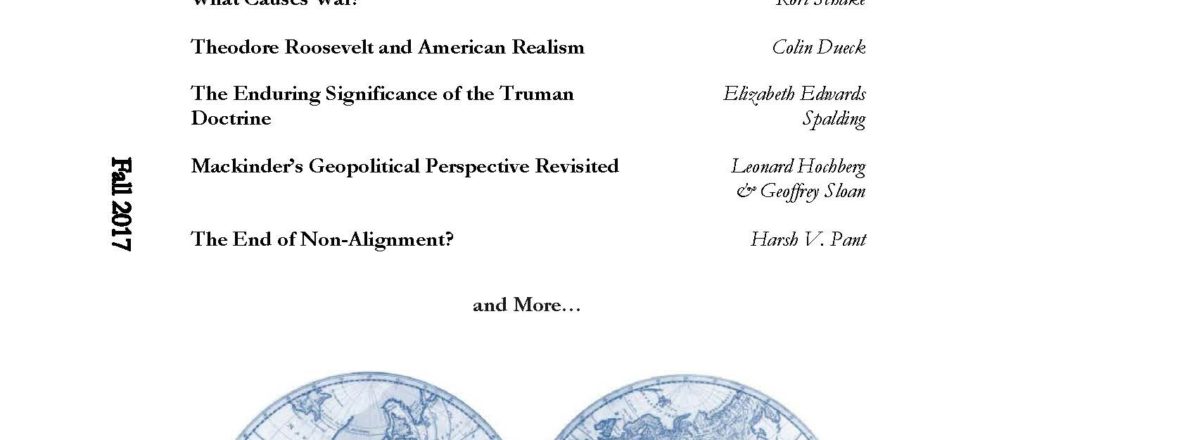A nation must think before it acts.
Announcing the Fall 2017 Issue of Orbis: FPRI’s Journal of World Affairs
Mac Owens
Welcome to the fall issue of Orbis, celebrating the 60th anniversary of the journal. We believe it is a strong issue indeed. We kick off the issue with Kori Schake’s splendid essay on the causes of war, in which she surveys commentators from Thucydides and Clausewitz to Geoffrey Blainey, Barbara Tuchman, and Azar Gat. The fact is that human beings can find many things over which to go to war.
Since this is our 60th anniversary issue, we thought it would be useful to reprint several prescient articles from past issues of Orbis, including memorable essays by two of my predecessors as editor. Accordingly, our first article cluster features: an appreciation of Orbis‘s founding editor, Robert Strausz-Hupé by Morton A. Kaplan from spring 1970; Walter McDougall’s reflection on the ability of the United States to “do” grand strategy from spring 2010; and James Kurth’s spring 2002 essay arguing—correctly it turns out— that the way the United States would conduct the wars after 9/11 would be greatly shaped by the nature of Western civilization and the nature of Islam.
Next, we are pleased to publish a very important essay on U.S. civil-military relations by Jeffrey W. Donnithorne, who provides a more nuanced understanding of the civil-military “bargain” than the one that treats the military as a monolith. He argues that the four services tend to act as “principled agents,” which view ambiguities in both the advising and executing phases of policy through the lens of their own service cultures.
The Non-Aligned Movement (NAM) was a creature of the Cold War purporting to represent developing states that wished to avoid alignments or alliances with either the Soviet Union or the United States. By virtue of its size, population, and location, India played a prominent role in the NAM. Harsh V. Pant contends that although some parts of the Indian establishment still favor non-alignment, the better course for New Delhi is to pursue a strategic autonomy that differs from non-alignment, which would allow India to benefit from leveraging partnerships rather than shunning them.
Our second article cluster offers appraisals of two American presidents’ statecraft. First, Colin Dueck assesses the statesmanship and foreign policy of Theodore Roosevelt, who combined diplomacy, energetic executive action, and credible naval capabilities to support this forward role, while avoiding strategic overextension. Dueck contends that Roosevelt’s presidency represents a good example of American foreign policy realism in action.
Elizabeth Edwards Spalding argues that although at age 70 the Truman Doctrine might be considered an artifact of history, the fundamental insights of this grand strategy—the employment of all instruments of national power; the creation and maintenance of alliances; and fostering an American-led liberal order—should still inform U.S. foreign policy.
Leonard Hochberg and Geoff Sloan offer a defense of classical geopolitics, as articulated by Halford Mackinder. Despite attempts to bury geopolitics as a way of looking at the world, the geopolitical perspective provides useful insights about the interaction of power and geographic space. This is especially the case as the United States considers possible responses to the occupation and domination of Mackinder’s Eurasian heartland by the Shanghai Cooperation Organization.
In our book review section, Frank Hoffman considers three books, written or edited by Graham Allison, James Lacey, and Xu Qiyu, that examine the risks of war as a rising power confronts the international status quo. Lukas Milevski reviews J.P. Clark’s Preparing For War: The Emergence of the Modern U.S. Army, 1815–1917, and I have convinced the editor to let me review Paul Miller’s defense of an American role in sustaining a liberal order.
Finally, I hope to see many of you at FPRI’s Annual Dinner on November 14th, which features former Secretary of Defense Ash Carter as the keynote speaker.




